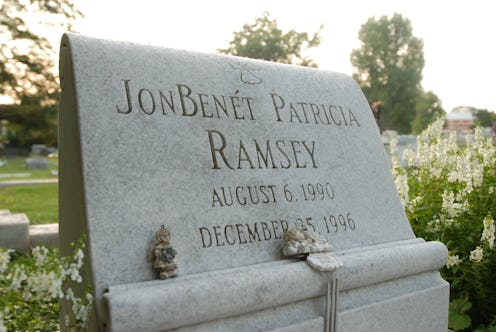
I'm as much a fan of true-crime as anyone, and this case in particular has enthralled me for years. And I'm not alone, which why another JonBenét Ramsey documentary is coming out. This one will be a mixture of fact and fiction, and people interested in the mystery of this particular murder should probably figure out which aspects of the JonBenét Ramsey case will Casting JonBenét fictionalize? The project premiere at the 2017 Sundance Film Festival later this month, and arrive on Netflix sometime in the spring. Not quite a documentary and not quite invented narrative, Casting JonBenét has described itself as a "sly and stylized" take on the 6-year-old beauty queen's unsolved murder on Christmas Day 1996. And while that's a very intriguing soundbite, what does it actually mean?
The Ramsey case is already so memorable to so many, and its been made even more familiar by the flood of coverage it received in 2016 for the 20th anniversary of the tragedy. With a case that iconic, what can you really make up? It's impossible to know for sure until the project hits Netflix, but the angle chosen by Casting JonBenét does give us some clues.
The documentary hybrid is helmed by director Kitty Green, who elected to build around a perspective of the tragedy that hasn't yet been explored as deeply as the others: the community that the Ramsey Family lived in. Green didn't have access to the family themselves, which is just as well, because that element of the case has been pounded into the ground. Nor did she focus much on the police force. Instead, she turned her attention to the city of Boulder itself. More so than anywhere else in the nation, Boulder, Colorado was rocked by the murder of JonBenét Ramsey, happening as it did right among them.
Green spent much of her time interviewing residents about the case — "elicit[ing] responses, reflections and even performances from the local community," according to Vulture — but, since we're now two decades out from the crime itself, I envision most people having difficulty reconstructing exact conversations or reporting precisely how they felt in any given moment. These potential memory gaps are the elements that I think Green will fill in, spinning out fictionalized interactions from the threads provided in interviews, and basing characters on the individuals she interviewed instead of replicating them exactly. That way, she isn't held to a standard of being completely accurate about conversations she wasn't present for, and everyone involved can speak more freely. It's a theory, but I think it fits given what we know about the documentary so far.
It's an approach that I imagine would allow audiences to lose themselves within an element of a story they thought they knew by heart, allowing them to see it through another pair of eyes. And who knows? Maybe seeing how the community has been shaped by this tragedy, both then and now, will provide some insight to someone, somewhere, on who might have committed this terrible crime over 20 years ago.